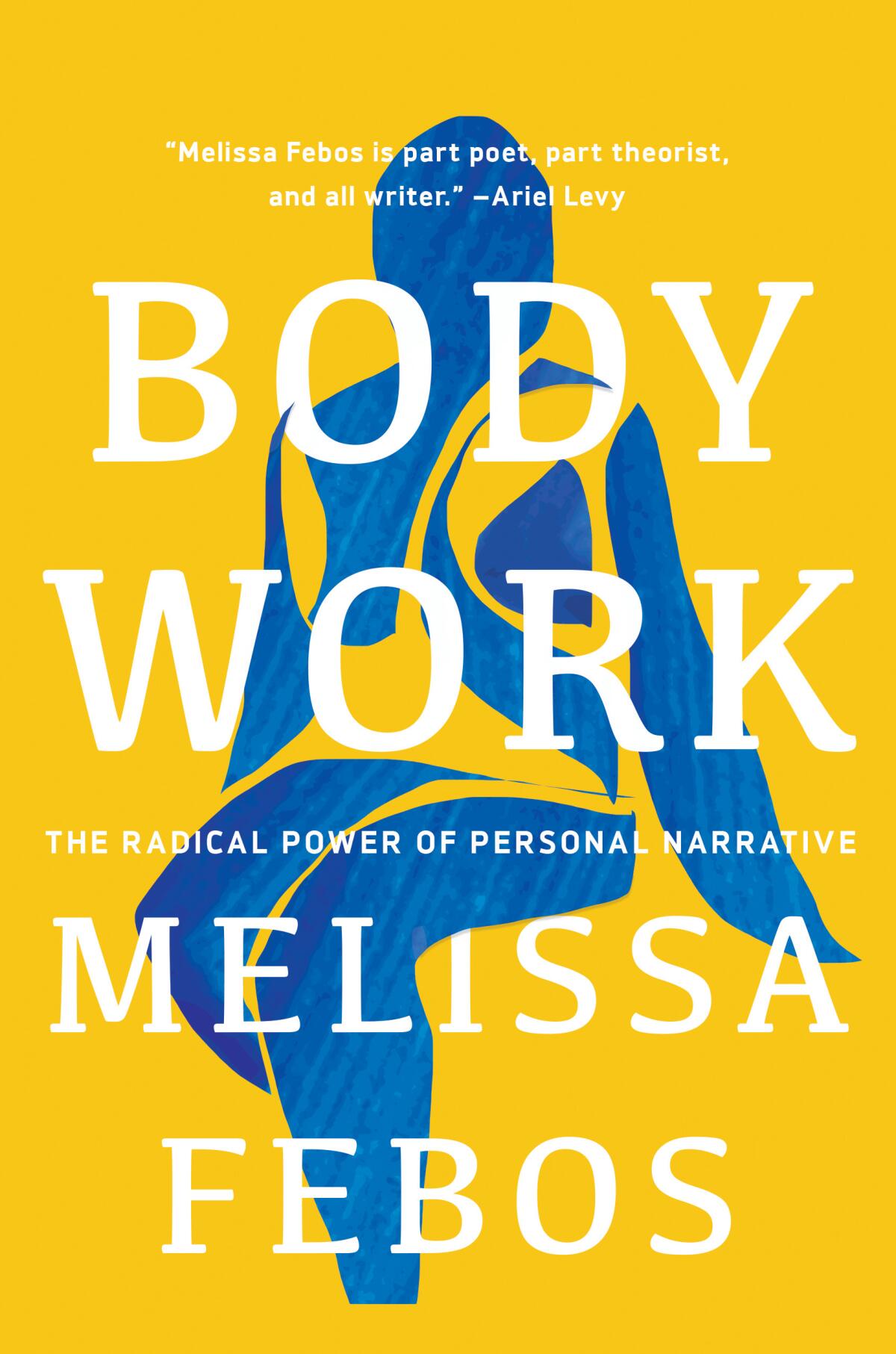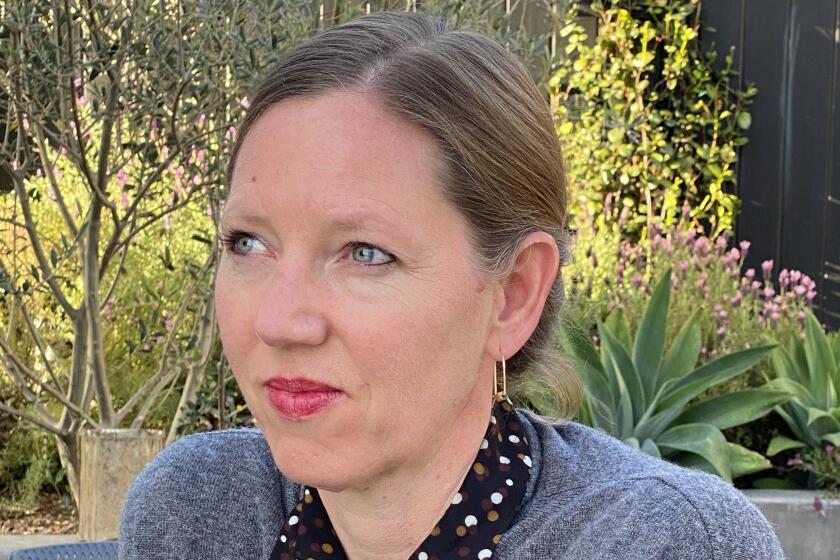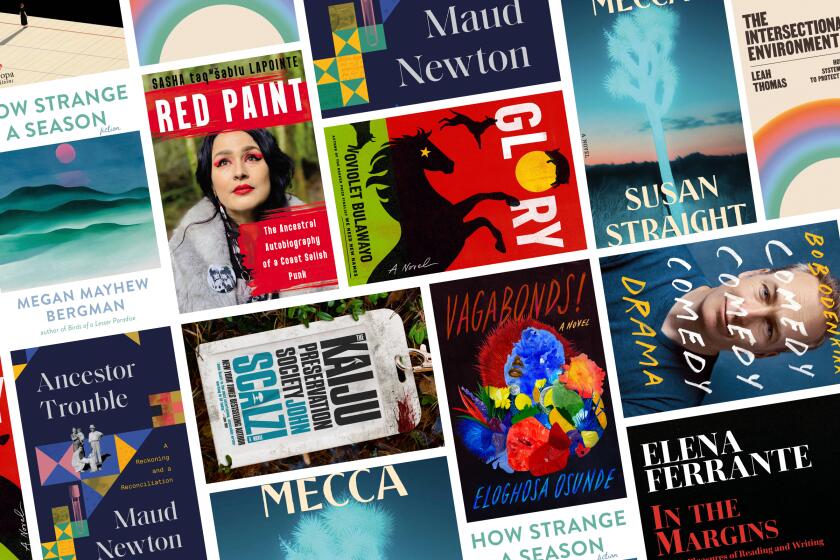More navel-gazing, please. Melissa Febos thinks personal essays can change the world

- Share via
On the Shelf
Body Work: The Radical Power of Personal Narrative
By Melissa Febos
Catapult: 192 pages, $17
If you buy books linked on our site, The Times may earn a commission from Bookshop.org, whose fees support independent bookstores.
The desire to confide, to be seen, is a universal human one; personal narrative is a way of reaping art from that desire. But only some people are taught that their lives are worthy of the endeavor.
During her 15 years teaching nonfiction, Melissa Febos listened to students criticize and dismiss their own projects as “navel-gazing.” Many had internalized the popular backlash against memoir as a debased form: clickbait, self-absorbed, a kind of narcissist’s public therapy pursued in lieu of writing Big Important Novels.
Febos noticed a pattern. The students most inhibited by these inner voices of doubt were not the straight white men. They were women. They were queer. They were people of color.
“Certain students of mine believed there was space and audience and value for their stories in the world,” she said in a recent phone interview, “and other students absolutely could not surmount the fear and belief that there wasn’t.”
One of America’s most accomplished memoirists, Febos, now 41, decided to build on the pep talks she gave to her students in an essay, “In Praise of Navel Gazing,” which became the first chapter of her new book, “Body Work: The Radical Power of Personal Narrative.”
This original, lyrical collection weaves memory and teaching — about craft, about trauma and healing, about social justice — into an ode to personal writing that couldn’t come at a more critical time: amid a nationwide assault on precisely these types of stories.
During an unprecedented surge in book bans by legislatures and school boards targeting LGBTQ writers and authors of color, Febos writes that “the resistance to memoirs about trauma is always in part — and often nothing but — a resistance to movements for social justice.”
All of us, to a greater or lesser extent, have internalized some antipathy for the idea of personal testimony as a form of high art. Febos did too. For much of her 20s, she thought she’d write fiction instead. But today she counters these stereotypes, writing: “It is not gauche to write about trauma. It is subversive.”
Kate Zambreno’s process is rumination and frenzy. That’s how she completed “To Write as if Already Dead,” an homage to the late writer Hervé Guibert.
Febos and I spoke about her new book on Feb. 24, the day of Russia’s invasion of Ukraine. At first, we both fumbled for words to articulate how we felt. I shared that I found it comforting to focus for a bit on something as hopeful as her book. She was glad for the distraction as well. But the news kept pulling us back. At one point, she choked up, wondering how we — meaning all of us — might “recoup our humanity and our conscience and our agency moving forward.”
It was our first real conversation, but we had read each other’s memoirs. (Febos blurbed my first book in 2018, but we have no other relationship). Her first memoir, “Whip Smart,” is about the four years she spent working as a dominatrix in Midtown Manhattan while overcoming addiction; her second, “Abandon Me,” explored her childhood with a sea captain father; and “Girlhood” focused on her coming of age and its related violations and abuses.
In conversation, Febos is down to earth and self-deprecating, with echoes of her literary voice. “The inside of my consciousness is super messy,” she insisted. “It looks like the way that my bedroom looks after I get home from a trip: suitcases burping up clothes everywhere. And the only way I organize my own thoughts is by writing them.”
“Body Work” seeks to demonstrate that the art of confession has a sacred power, capable of transforming us individually and collectively — and as much if not more than other genres.
Febos begins by dismantling the false binary between the emotional, which we’re conditioned to associate with the female and the body, and the intellectual, which we consider to be lofty and male.

In praise of literal navel-gazing, she observes that she could write something intellectual and political about the knotty depression in our bellies that once tied us to our mothers. “I don’t think it’s a stretch to wonder if the navel, as the locus of all this disdain, has something to do with its connection to birth, and body, and the female,” she writes.
Febos said she chose to center the body in the title to help ground her and the book: to dispel the learned impulse to disembody our writing. She devotes an entire chapter to writing better sex, delving into the need to defy patriarchal programming about what good sex looks like and examining how Carmen Maria Machado, Eileen Myles and other writers manage to transfigure the taboo into something transcendent and irresistible.
In a guest column for The Times, author and “Law & Order” fan Carmen Maria Machado explains what makes the characters more powerful together than alone.
The book is illuminating but not didactic. Febos approached it as she did her previous books — as a dialogue with herself, slowly discovering deeper, more difficult truths. She is unapologetic about the form’s cathartic potential.
“How many times have I been privy to conversations among other writers in which we sneer at the very concept?” Febos writes. “We compulsively assure each other that writing isn’t about enacting a kind of therapy. How gross! We are intellectuals. We are artists.”
Febos subverts those assumptions by briefly describing how each of her books transformed her. “Whip Smart” began the process of freeing her from escapism. “Abandon Me” helped her end a toxic relationship. “Girlhood” gave her clarity about abuses she had been unable to name before. She emerged with new empathy for her younger self and, consequently, a sense of wholeness.
But it’s ongoing work. “I try to remind myself that I am doing a kind of work in myself and my relationships that is trying to counter centuries of contradictory motion,” said Febos. She sees regressive movements in society through that lens too: “We fail to do that [work] as a nation the same way we struggle to do that as individuals.”
Personal narrative, in her framing, is an exercise in humility and doggedness, a refusal to stick to the first version of one’s story. The most powerful such writing, she argues, layers perspectives from the past and the present.
“Body Work” examines and exhibits these lessons. In one passage, Febos recalls an interview she gave years ago in which she quipped of her adolescence that she was “busy getting finger-banged behind the mall.” She writes: “I cringe now, to even type these words. Not because they are crude, but because they are cruel.”
Maggie Nelson, whose essays and poetry have changed the way we think about art, queerness and gender, talks about her timely new book, “On Freedom.”
But what was behind the impulse? She analyzes her prior belief in “the fantasy of toughness — the idea that lack of feeling signified mastery of it.” She notes: “It is true that there is a kind of social power in the pageantry of uncaring. It renders one less vulnerable to others. That protection can exact a steep price.”
Febos could have stopped there. But this is a book that explores self-reflection as a path to rebirth. “Time and experience have softened me,” she adds, “even to the instinct that prompted [the quip]. It was an early attempt to manage the pain of that time.”
While most books about memoir writing focus on craft, “Body Work” probes its power to transform our relationships to our bodies, our memories and other people. Her subject, as she identifies it in her book, is the “revolutionary power of undoing the narratives we’ve been taught about ourselves, and how that project might make us not only better writers and lovers, but more human to ourselves.”
Febos, an associate professor of nonfiction at the University of Iowa, drew inspiration from Audre Lorde’s essay collection “Sister Outsider” and other works of theory. The book is dedicated to her students.
“For me,” she said, “there have been so many subjects and experiences that I was actually incapable of saying aloud to another person, and the only place where I could articulate them was in writing. And that process of externalizing my own stories ... became a bridge to intimacy and dialogue with other people.”
She believes this process has world-changing potential. Reading Febos and speaking with her, it becomes less difficult to imagine how our species might examine our collective traumas and gravest mistakes with an open heart. But it will take body after body, a tug of war against the weight of history.
Bethanne Patrick’s March picks include works by Bob Odenkirk and Elena Ferrante, as well as an Indigenous punk memoir and magical African allegories.
More to Read
Sign up for our Book Club newsletter
Get the latest news, events and more from the Los Angeles Times Book Club, and help us get L.A. reading and talking.
You may occasionally receive promotional content from the Los Angeles Times.










